Sometimes smoke detector might start beeping without any reason. In such a situation, it is called a false alarm or bugs. And, if you want to keep bugs out of smoke detectors then here we have a perfect guide to resolve all your problems.
How To Keep Bugs Out Of Smoke Detectors?
Quick Navigation
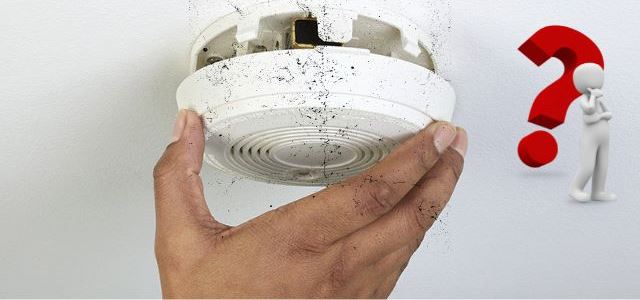
Examine your smoke alarm to see if it is working properly. You must’ve seen small holes in your fire detector. These small holes can help make a permanent room for small bugs and insects. Pests could indeed set off the alert system by meddling with the detectors when inside. You might want to check your alarm from time to time to see if anything is creeping on inside. Here are some ways you can prevent pests from entering your alarms-
1. Make Use Of Compressed Air- Use compressed air to wipe down the nooks and crannies in the smoke alarm regularly. It’ll also remove any dust particles from the device. If there is a spider web or eggs inside, the gas will help remove it out as well. Troubling a spider’s home will cause it to try to escape. Before you begin, check sure the connection is turned off. Remove the top of the fire detector and blow it out with compressed air after properly arranging. This must clear out any dust or junk that is blocking the detector’s operation.
2. Use a vacuum- If you find creatures inside the smoke detector, empty them with an attachment. After which, using compressed air, strike out any remaining particles or dirt. If necessary, vacuum around the inside of the device too.
3. Get rid of their food- It’s quite obvious that if you have insects such as spiders in your detectors. It may be because you have other insects living in your home that might be the source of attraction for the spiders. After all, they need to feed on the other tiny pests. It’s best to try removing other small creatures as well. It seems that most bugs hate the smell or taste of saltwater. So, the next time you’re questioning how to get rid of little bugs in the house, mix a little salt with water and spray it on surfaces and areas of the house where insects are likely to be found.
4. Use essential oils to get rid of them- In a plastic container full of water, combine several drops of essential cardamom, tangerine, or lemon oil. Sprinkle the remedy in areas where you see insects, including around doors and windows and other insect entry points. A remedy of water and white vinegar also tends to do a good job.
5. Consider a replacement- Take account of the age of the smoke alarm when checking it. It’s necessary to update it if it’s more than ten years old. The problem might not only be insects if your detector is way too old. It’ll eventually open doors to problems like such. If you find that your fire alarm has exceeded the limit of its age and has been causing problems now and then even if you’ve repaired it, replace it with a new one. There are many options available in the market and you can find a reasonable one that does its job well.
How Do Smoke Detectors Operate?
If we don’t know how an alarm works, how are we supposed to understand why the false alarm happens? Smoke detectors sense burns by applying a series of methods to monitor tiny air pollutants.
They trigger an alert when they identify ions beyond a fixed limit, allowing you and your family to evacuate to safety. The two types of smoke alarms are-
1) Photoelectric smoke alarms-
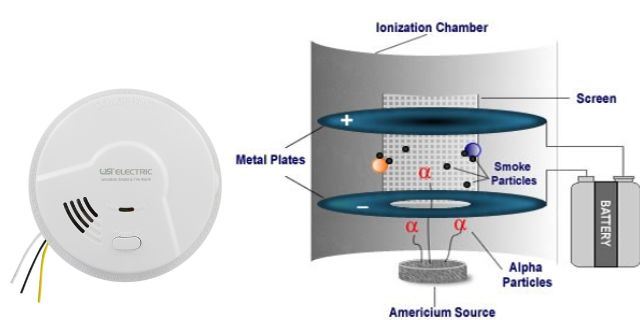
These are alarms that are more sensitive to the smoke that has been released by a fire lit up for a long period. Photoelectric alarms throw lighting at a height away from the object into a sensing chamber. When smoke is detected in the chamber, it reflects light onto the light sensor, causing the alarm to beep.
2) Ionization smoke alarms-
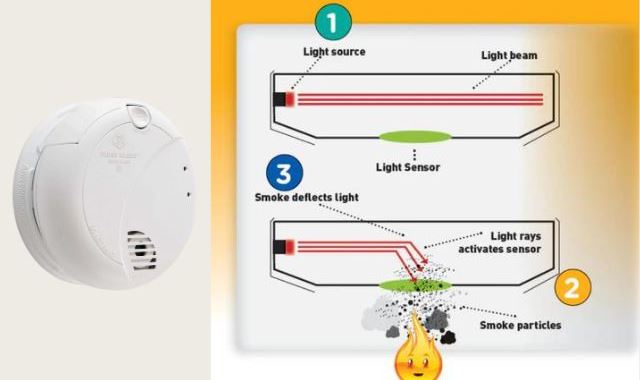
These alarms seem to be more sensitive to smoke in general. Ionization-type smoke detectors contain a radioactive source sandwiched between two ionized plates, ionizing the air and causing power to pass in between sheets. When ignition occurs in the chamber, it disturbs the passage of ions, lowering the flow of electricity and boosting the alert system.
At times people recommend having both these types of alarms installed.
What To Do If Smoke Alarm Goes Off?
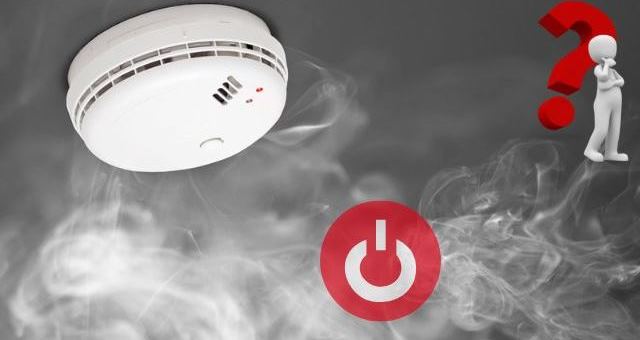
At times, people are complaining of their alarm being set off. Have you ever wondered what might be the reason?
Some of the reasons about how your alarm might go off are listed below-
a. Dust and bugs must be removed – Although dust and insects are unpleasant, these are quite easy to clean from your smoke alarms at home. In reality, the existence of dirt or the action of a tiny bug is enough to turn off the smoke detector. Dirt sometimes reflects photons in the same way as the flame does, resulting in a fake alarm. Opening the hard layer and physically eliminating dust or dirt is the best approach to clean this. To clear the tiny dust particles, use an aerosol cleaner or a vacuum attachment, and give close attention to the detectors.
b. The Alarm’s Positioning- You know, the positioning of the smoke detector can be a huge cause of why false alarms occur. If you’re getting a lot of false alerts, you might just want to rethink where you put your smoke detectors. You may prefer to move those if they are directly above a place that causes a lot of smoke or steam. Smoke detectors should be installed in the following regions in your houses- Nearby fire dangers including a stove near the kitchen and stairwells in each bedroom corridor
c. Examine the connection as well as the battery life- If dust and pests are not the issues, the batteries should be examined. If the batteries have begun to expire or if it is not correctly attached, a smoke detector may emit a fake signal. If the annoying alarms persist, remember to check this and change the battery.
d. Humidity Management- Moisture can confuse the senses into thinking it’s smoke, resulting in a false alert. If that’s an issue, consider diverting the steam. If humidity gets inside the smoke detector, the only solution is to replace it. If you’re still getting false alarms, it’s probably time to hire a specialist. They can figure out what’s causing this and prevent them from happening again. Moreover, next time remember to choose a high-quality smoke detector that doesn’t go off for no reason.
Why Smoke Alarm Beeps For No Reason?
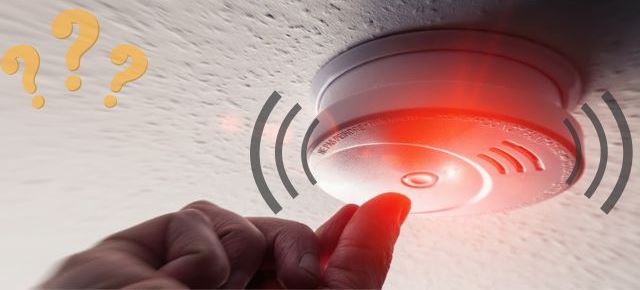
When the cell in a smoke alarm needs to be replaced, it should emit a buzzing sound. Certain inaccuracies are stored in the processor of modern smoke detectors.
The smoke detector should erase any faults after the cells are replaced, although it may persist to beep even after the cells are replaced. This is most common in smoke detectors that are converted into electrical energy and have a backup battery.
Whenever this happens, the only method to silence the tweeting is to directly clear the fault from the processor by resetting the smoke detector.
- Temperature Fluctuations in the Home: Temperature changes in the household may be another cause for a smoke detector buzzing or tweeting sporadically. The smoke detector detects whether you set the temperature to an unusually high or low setting and sounds an alarm. The smoke detector may also beep if it senses gas coming from the bathroom or kitchen.
- It’s Time To Replace it: Its life has come to an end. A smoke alarm may also beep because it has neared the end of its life. The average lifespan of a smoke detector is eight to ten years. Remove the smoke alarm and look at the back for the date of manufacture. If the smoke detector is far more than eight years old, it should be replaced as soon as possible. A bad smoke detector can be very hazardous for people with hearing or viewing disabilities, so always choose a high-quality smoke detector for the hearing-impaired people around you.
What Temperature Sets Off A Smoke Detector?
The temperature that sets off the alert is usually around 135 degrees. Extreme temps are a sure sign of a disaster. Both rate-of-rise and fixed temperature detectors are excellent for detecting burns.
Indications That Your Smoke Alarm Is bad
- The smoke alarm constantly goes off for no apparent reason.
- Even after battery replacement, there is occasional buzzing.
- The smoke detector’s alarm does not sound when the testing button is pressed.
- The last time you changed the battery in your smoke alarm, was less than a year ago.
- Stove gas, smoking bread, moisture, and other factors have increased the sensitivity of your smoke alarm.
FAQ
1. How Bugs Can Damage Smoke Sensors?
Although some people enjoy bugs, the greater part regards them as pests. Bugs can get into almost anything and cause havoc. You don’t want bugs creeping into your fire alarms. They can creep around and set off the system when they do.
2. Can Bugs Set Off Smoke Detectors?
Although pests and grime are unpleasant, they are quite simple to clean from your smoke alarm. The visibility of dirt or the activity of little eight-legged invaders can be enough to set off the awful smoke detector. Dirt can scatter light beams in the same way as smoke does, causing a misleading fire alarm.
Smoke alarms are super delicate, even little spiders and flies can set them off. With vinegar and water, you can construct a simple yet powerful spider repellent. Fill a container halfway with water and the other half with white vinegar. To get rid of spiders, spray all gaps or holes in your apartment’s flooring, ceilings, and openings.
3. How To Tell If A Smoke Detector Is Bad?
If your smoke detector hasn’t been replaced after a few years or it hasn’t been cleaned occasionally. You might be inviting various problems such as false alarms, constant beeping or chirping, or the alarm not going off when there’s actual need.
For example, it didn’t make any noise when your stove caught fire. This may end up causing something big and could turn out to be very dangerous. If this happens, you may say that your smoke detector is bad.
4. What Is Spider Setting Off Smoke Alarm?
Spider setting off a smoke alarm surely means you have a spider in there! Small insects and insects can access the compartment through the openings in your smoke alarm where smoke can pass. They may create chaos in your fire detector’s inner area.
While security systems are designed to sound only when they sense burning, insects can trigger them by messing with the detectors. They can chew, gnaw, or squish the pieces and circuits of the smoke alarm, enabling it to activate or become malfunctioning.
5. After How Much Time One Could Feel Smoke Detecting Sensors?
The most common cause of fire alarms going off suddenly is that the cells were not changed frequently sufficient. Since smoke in the air reduces the current, this is the case. When your battery dies, the power running via your detector decreases as well. As a result, a false positive is possible.
The quantity of power produced by a smoke alarm’s battery as it approaches the end of its life creates an internal resistance. In between hours of 2 a.m. and 6 a.m., many homes are at their coolest.
That’s why, in the middle of the night, the monitor may make a minimal beep before turning off when the house heats a few degrees.
Final Talk
If you still have any cause to assume your fire alarms are failing, repair them as soon as possible. A functioning smoke detector is important for the early identification of a tragedy in your house, providing you and your families enough time to get away. A functioning smoke detector is on duty 24 hours a day, 7 days a week! Since inhabitants are uninformed of the burning until there is little time to get away, the percentage of deadly accidents occurs when people are sleeping. Heating spreads easily farther and quicker than dust and harmful chemical. That is one of the reasons why so many fire sufferers die from toxic fumes and poisonous gas intake rather than injuries.






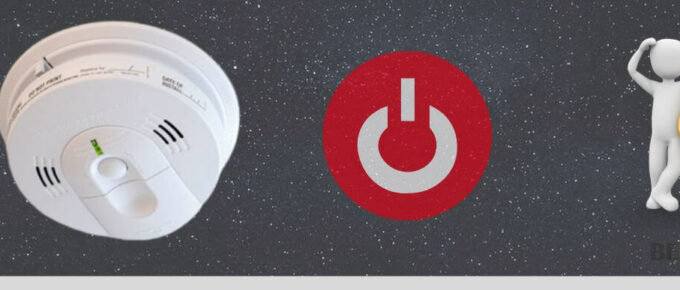
Leave a Reply